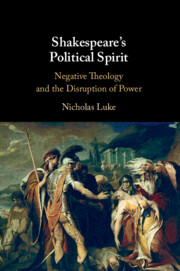Book contents
- Shakespeare’s Political Spirit
- Shakespeare’s Political Spirit
- Copyright page
- Contents
- Acknowledgements
- Introduction
- Chapter 1 Jack Cade in a Time of Protest
- Chapter 2 The Spirit of Caesar and the Second Circle
- Chapter 3 Coriolanus and the Work of Spirit
- Chapter 4 Not to Be – To Be
- Chapter 5 The Tempest and the Spirit of the Air
- Afterword
- Notes
- Works Cited
- Index
- References
Works Cited
Published online by Cambridge University Press: 12 December 2024
- Shakespeare’s Political Spirit
- Shakespeare’s Political Spirit
- Copyright page
- Contents
- Acknowledgements
- Introduction
- Chapter 1 Jack Cade in a Time of Protest
- Chapter 2 The Spirit of Caesar and the Second Circle
- Chapter 3 Coriolanus and the Work of Spirit
- Chapter 4 Not to Be – To Be
- Chapter 5 The Tempest and the Spirit of the Air
- Afterword
- Notes
- Works Cited
- Index
- References
- Type
- Chapter
- Information
- Shakespeare's Political SpiritNegative Theology and the Disruption of Power, pp. 265 - 271Publisher: Cambridge University PressPrint publication year: 2024

